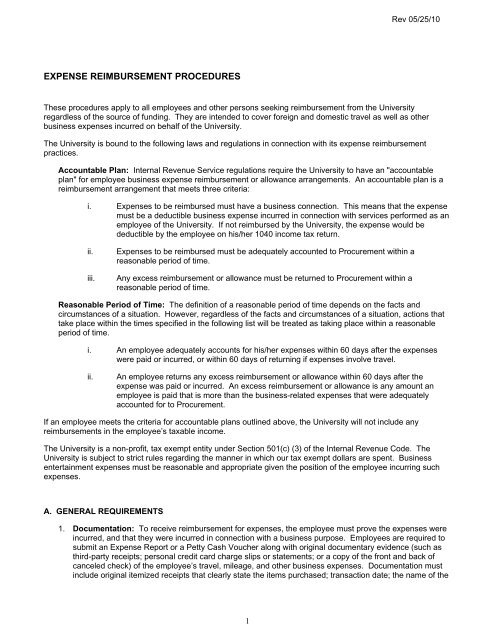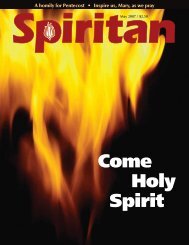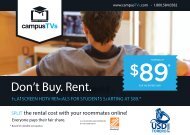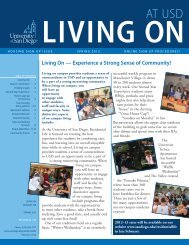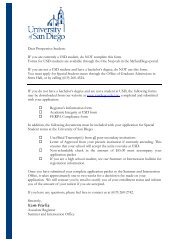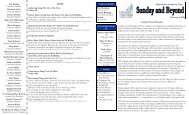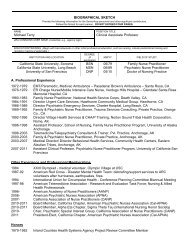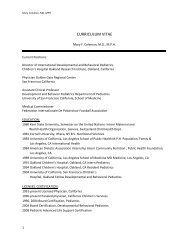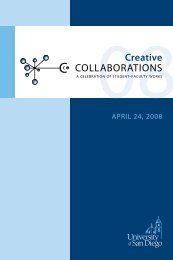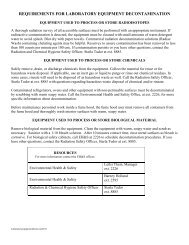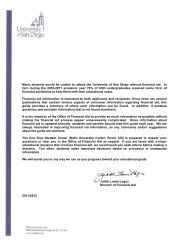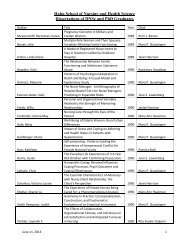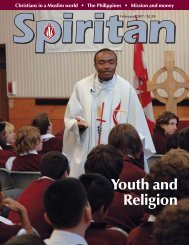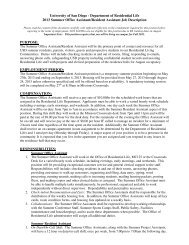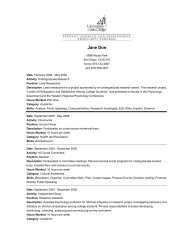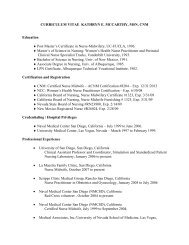expense reimbursement procedures - University of San Diego
expense reimbursement procedures - University of San Diego
expense reimbursement procedures - University of San Diego
You also want an ePaper? Increase the reach of your titles
YUMPU automatically turns print PDFs into web optimized ePapers that Google loves.
Rev 05/25/10<br />
EXPENSE REIMBURSEMENT PROCEDURES<br />
These <strong>procedures</strong> apply to all employees and other persons seeking <strong>reimbursement</strong> from the <strong>University</strong><br />
regardless <strong>of</strong> the source <strong>of</strong> funding. They are intended to cover foreign and domestic travel as well as other<br />
business <strong>expense</strong>s incurred on behalf <strong>of</strong> the <strong>University</strong>.<br />
The <strong>University</strong> is bound to the following laws and regulations in connection with its <strong>expense</strong> <strong>reimbursement</strong><br />
practices.<br />
Accountable Plan: Internal Revenue Service regulations require the <strong>University</strong> to have an "accountable<br />
plan" for employee business <strong>expense</strong> <strong>reimbursement</strong> or allowance arrangements. An accountable plan is a<br />
<strong>reimbursement</strong> arrangement that meets three criteria:<br />
i. Expenses to be reimbursed must have a business connection. This means that the <strong>expense</strong><br />
must be a deductible business <strong>expense</strong> incurred in connection with services performed as an<br />
employee <strong>of</strong> the <strong>University</strong>. If not reimbursed by the <strong>University</strong>, the <strong>expense</strong> would be<br />
deductible by the employee on his/her 1040 income tax return.<br />
ii.<br />
iii.<br />
Expenses to be reimbursed must be adequately accounted to Procurement within a<br />
reasonable period <strong>of</strong> time.<br />
Any excess <strong>reimbursement</strong> or allowance must be returned to Procurement within a<br />
reasonable period <strong>of</strong> time.<br />
Reasonable Period <strong>of</strong> Time: The definition <strong>of</strong> a reasonable period <strong>of</strong> time depends on the facts and<br />
circumstances <strong>of</strong> a situation. However, regardless <strong>of</strong> the facts and circumstances <strong>of</strong> a situation, actions that<br />
take place within the times specified in the following list will be treated as taking place within a reasonable<br />
period <strong>of</strong> time.<br />
i. An employee adequately accounts for his/her <strong>expense</strong>s within 60 days after the <strong>expense</strong>s<br />
were paid or incurred, or within 60 days <strong>of</strong> returning if <strong>expense</strong>s involve travel.<br />
ii.<br />
An employee returns any excess <strong>reimbursement</strong> or allowance within 60 days after the<br />
<strong>expense</strong> was paid or incurred. An excess <strong>reimbursement</strong> or allowance is any amount an<br />
employee is paid that is more than the business-related <strong>expense</strong>s that were adequately<br />
accounted for to Procurement.<br />
If an employee meets the criteria for accountable plans outlined above, the <strong>University</strong> will not include any<br />
<strong>reimbursement</strong>s in the employee’s taxable income.<br />
The <strong>University</strong> is a non-pr<strong>of</strong>it, tax exempt entity under Section 501(c) (3) <strong>of</strong> the Internal Revenue Code. The<br />
<strong>University</strong> is subject to strict rules regarding the manner in which our tax exempt dollars are spent. Business<br />
entertainment <strong>expense</strong>s must be reasonable and appropriate given the position <strong>of</strong> the employee incurring such<br />
<strong>expense</strong>s.<br />
A. GENERAL REQUIREMENTS<br />
1. Documentation: To receive <strong>reimbursement</strong> for <strong>expense</strong>s, the employee must prove the <strong>expense</strong>s were<br />
incurred, and that they were incurred in connection with a business purpose. Employees are required to<br />
submit an Expense Report or a Petty Cash Voucher along with original documentary evidence (such as<br />
third-party receipts; personal credit card charge slips or statements; or a copy <strong>of</strong> the front and back <strong>of</strong><br />
canceled check) <strong>of</strong> the employee’s travel, mileage, and other business <strong>expense</strong>s. Documentation must<br />
include original itemized receipts that clearly state the items purchased; transaction date; the name <strong>of</strong> the<br />
1
Rev 05/25/10<br />
business establishment; the location; the cost; the business purpose; and the names <strong>of</strong> all persons<br />
involved. Credit card receipts in lieu <strong>of</strong> itemized receipts are not an acceptable form <strong>of</strong> documentary<br />
evidence. On-line receipts are acceptable provided they reflect the method and pro<strong>of</strong> <strong>of</strong> payment in<br />
addition to the above items. Although exceptions to the documentation requirement are allowed (such as<br />
for mileage, metered parking, and cash gratuities), an explanation is required and the <strong>expense</strong>s must be<br />
reasonable. See Section B for the definition <strong>of</strong> what is reasonable.<br />
2. Methods <strong>of</strong> Payment: The following methods should be used by employees when incurring business<br />
<strong>expense</strong>s:<br />
• Travel and Entertainment Card – The <strong>University</strong> encourages the use <strong>of</strong> the travel and<br />
entertainment card for travel <strong>expense</strong>s wherever possible. Refer to the travel and entertainment<br />
card <strong>procedures</strong> at www.sandiego.edu/travelcard for more information.<br />
• Expense Report – Use the Expense Report for all travel and entertainment card <strong>expense</strong>s as<br />
well as for the <strong>reimbursement</strong> <strong>of</strong> travel, lodging, meals, incidentals, mileage, and supplies not<br />
requiring a Purchase Requisition where the aggregate <strong>reimbursement</strong> amount exceeds $100.<br />
Expense Reports should be completed with all documentary evidence attached, proper approvals<br />
obtained (see #3 below), and then sent to Procurement for check processing. Expense Reports<br />
should not include extraneous receipts or invoices outside <strong>of</strong> <strong>expense</strong>s to be reimbursed.<br />
• Petty Cash Vouchers – Use the Petty Cash Voucher for the <strong>reimbursement</strong> <strong>of</strong> travel, meals,<br />
incidentals, mileage, supplies, and other miscellaneous items where the aggregate<br />
<strong>reimbursement</strong> amount is $100 or less. Petty Cash Vouchers should be completed with all<br />
documentary evidence attached and then presented to the <strong>University</strong> Cashier for cash<br />
<strong>reimbursement</strong>. Petty Cash Vouchers may not be used for per diem <strong>reimbursement</strong>.<br />
3. Approval: Expense Reports must be authorized by the employee’s supervisor and the project’s budget<br />
administrator who, together with the employee, are held accountable that <strong>expense</strong>s were incurred in<br />
connection with a business purpose. Petty Cash Vouchers must be authorized by the project’s budget<br />
administrator. Expense Reports and Petty Cash Vouchers not reflecting the appropriate approval will be<br />
returned to the requestor.<br />
4. Payment Schedule: Procurement will process a <strong>reimbursement</strong> check for a properly completed and<br />
authorized Expense Report within 7 business days. Procurement generates checks each Monday,<br />
Wednesday, and Friday. Checks are mailed on the day processed. Checks will only be held at Cashier’s<br />
Office for pick up under special circumstances.<br />
B. REIMBURSEMENT METHODS<br />
The <strong>University</strong> uses the per diem standards established by the IRS as a guideline for what is considered<br />
reasonable travel <strong>expense</strong>s. Employees may use the per diem method or the actual <strong>expense</strong> method <strong>of</strong><br />
<strong>reimbursement</strong>.<br />
Per Diem Method – Employees may use the per diem method when requesting <strong>reimbursement</strong> for travel<br />
<strong>expense</strong>s when travel involves overnight stay. Requests for per diem <strong>reimbursement</strong> shall be submitted to<br />
Procurement on an Expense Report approved by the employee’s supervisor and the project’s budget<br />
administrator, after the completion <strong>of</strong> travel. Employees may not request per diem <strong>reimbursement</strong> through the<br />
use <strong>of</strong> a Petty Cash Voucher. Employees must prove dates and locations <strong>of</strong> business travel by submitting<br />
supporting documentation. Employees must specify whether a per diem is requested for meals/incidental<br />
<strong>expense</strong>s, lodging, or both. Employees must actually incur these <strong>expense</strong>s in order to receive per diem<br />
<strong>reimbursement</strong>. Employees must also specify the business purpose on all <strong>reimbursement</strong> requests. For domestic<br />
and foreign IRS per diem allowances by locale, refer to www.gsa.gov.<br />
2
Rev 05/25/10<br />
Actual Expense Method - Expenses incurred while traveling on <strong>University</strong> business may be reimbursed using the<br />
actual <strong>expense</strong> method. Requests for actual <strong>expense</strong> <strong>reimbursement</strong> shall be submitted to Procurement on a<br />
properly approved Expense Report after the completion <strong>of</strong> travel. All documentary evidence must conform to the<br />
requirements in Section A.1. <strong>of</strong> these <strong>procedures</strong>. Foreign travelers must clearly document the rate <strong>of</strong> exchange<br />
used to convert the <strong>expense</strong>s into the United States currency equivalent on the Expense Report. For foreign<br />
currency conversion rate table, refer to www.oanda.com. The <strong>University</strong> depends on its employees to exercise<br />
prudence in selecting restaurants thus <strong>University</strong> will not reimburse meal cost deem lavish or otherwise<br />
extravagant. The <strong>University</strong> will reimburse meal costs that are reasonable. The measure <strong>of</strong> reasonable meal<br />
costs shall be the IRS standard per diem allowance for the city in which the meal is conducted.<br />
C. TRAVEL ADVANCES<br />
A travel advance is money paid to an employee in advance <strong>of</strong> a <strong>University</strong> business trip that will be applied<br />
toward actual travel <strong>expense</strong>s. Advances will only be used when necessary and under special circumstances as<br />
approved by the appropriate Vice President. Travel advances are administered by Procurement and should be<br />
limited to the minimum amount necessary for the trip. Travel advances cannot exceed IRS standard per diem<br />
allowances. The employee should submit a Check Request approved by the employee’s supervisor and the<br />
project’s budget administrator, allowing a minimum 7 business days for advance checks to be issued. Employees<br />
may also receive advances in cash for $100 or less by submitting a Petty Cash Voucher, approved by the<br />
project’s budget administrator, to the Cashier's Office. If travel arrangements are canceled, all advances must be<br />
returned to either the Cashier's Office or Procurement depending on how the advance was issued.<br />
1. Settling Travel Advances: The settlement <strong>of</strong> travel advances with Procurement is required within ten<br />
business days returning from travel. Employees may settle travel advances by completing an Expense<br />
Report and attaching third-party receipts with the necessary notations as to business purpose and<br />
persons involved. The Expense Report must report the amount <strong>of</strong> the travel advance in the appropriate<br />
section and be approved by the employee’s supervisor and the project’s budget administrator. The<br />
settlement <strong>of</strong> travel advances are not to be combined with the travel and entertainment card <strong>expense</strong>s.<br />
Settlement is deemed complete when the employee reimburses the <strong>University</strong> for excess advances, or<br />
the <strong>University</strong> reimburses the employee for excess actual <strong>expense</strong>s. Past due advances must be settled<br />
before an employee is eligible for any additional advances. Failure to settle a travel advance within the<br />
specified timeframe will result in the recognition <strong>of</strong> the advance as taxable income to the employee and<br />
the revocation <strong>of</strong> the privilege for receiving future advances. Additionally, failure to settle a travel<br />
advance may result in an internal audit <strong>of</strong> an employee’s <strong>expense</strong> practices.<br />
2. Advances for Purposes Other Than Travel: Advances for purposes other than travel are permitted for<br />
future expenditures if the expenditures cannot be properly charged to the purchasing card, funded<br />
through petty cash, or processed through the normal procurement channels (i.e., through the issuance <strong>of</strong><br />
a Purchase Order to the vendor directly). Wherever possible, written documentation (i.e., vendor<br />
estimates, quotations, etc.) should be included to support the amount <strong>of</strong> the advance requested.<br />
3. Disallowed Advances: Advances will not be issued for the purchase <strong>of</strong> equipment or services rendered<br />
by a third party.<br />
D. TRAVEL EXPENSES<br />
1. General: An employee’s travel must be authorized in advance by his/her supervisor. Reimbursable<br />
travel <strong>expense</strong>s are limited to those <strong>expense</strong>s that are ordinary and necessary in the conduct <strong>of</strong><br />
<strong>University</strong> business. Employees are required to use the most economical method <strong>of</strong> transportation when<br />
planning their travel arrangements.<br />
2. Airfare: All individuals traveling on <strong>University</strong> business shall use the most economical class <strong>of</strong> service<br />
available, and not be biased by potential frequent flyer benefits.<br />
• Using the <strong>University</strong>’s Preferred Travel Agency – Employees are strongly encouraged to make<br />
their travel arrangements through the <strong>University</strong>’s preferred travel agency. For more information on<br />
3
Rev 05/25/10<br />
current preferred travel providers, please visit www.sandiego.edu/travelcard<br />
• Alternative Travel Agency, Internet, or Direct Booking – Employees are encouraged to use the<br />
travel and entertainment card to obtain competitive rates. When requesting <strong>reimbursement</strong>, the<br />
employee must provide an original ticket less receipt, original passenger receipt, or original boarding<br />
pass from the airline as pro<strong>of</strong> <strong>of</strong> travel. Faxed copies <strong>of</strong> these documents are not acceptable and<br />
transaction fees stemming from using an alternative travel agency (i.e., a travel agency other than the<br />
<strong>University</strong>’s preferred travel agency) will not be reimbursed if they exceed the transaction fees<br />
charged by the <strong>University</strong>’s preferred travel agency.<br />
If a flight is not taken, employees are responsible for ensuring any credit vouchers issued are used for<br />
future business purposes. Supervisors are accountable to ensure all travel by employees, regardless <strong>of</strong><br />
payment method, is used for business purposes.<br />
Travel advances for the purchase <strong>of</strong> airline tickets is prohibited.<br />
Business-class or first-class upgrades are not reimbursable business <strong>expense</strong>s and must be paid with<br />
personal funds. Membership fees for airline VIP or frequent flier clubs are not reimbursable business<br />
<strong>expense</strong>s and must be paid with personal funds.<br />
It is the employee’s responsibility to adhere to the airline’s cancellation policy. The employee will be held<br />
financially responsible for changes in flight reservations that are made for non-business reasons, and “noshow”<br />
charges incurred due to an unreasonable failure to cancel the reservation.<br />
Airline mileage earned in the conduct <strong>of</strong> <strong>University</strong> business is credited to the employee. Airline travel<br />
vouchers and frequent flier mileage are not reimbursable to employees for travel in connection with<br />
<strong>University</strong> business. The <strong>University</strong> does not purchase airline vouchers or coupons from employees.<br />
International Travel – USD provides health insurance and emergency medical and security assistance to<br />
faculty, staff and students who travel internationally on <strong>University</strong> related business or study. Health<br />
insurance is secondary to applicable personal coverage and is designed to respond to emergent health<br />
needs. Routine care is not provided. There is a $100 deductible per illness/injury. Each traveler must<br />
register their trip with the International Center prior to departure; groups may be registered by the group<br />
leader. Please see additional coverage details on the Risk Management website.<br />
http://www.sandiego.edu/administration/financeadmin/facilities/risk/vehiclesIntl.php<br />
3. Meals: If meals are included in the conference registration fee, the employees will not be reimbursed for<br />
any additional cost related to those meals. Conference registration materials should be provided with the<br />
<strong>reimbursement</strong> requests for related meals.<br />
4. Alcohol and Business Travel: The <strong>University</strong> will pay for the cost <strong>of</strong> alcoholic beverages up to a<br />
reasonable amount. Prudence should be used in the purchase <strong>of</strong> such beverages as they may comprise<br />
a significant portion <strong>of</strong> the cost <strong>of</strong> the meal. It is suggested that travelers limit <strong>expense</strong>s for alcoholic<br />
beverages to the average cost <strong>of</strong> approximately $10, and not to exceed $15 per person. Alcoholic<br />
beverages consumed by travelers between or after mealtimes are not considered meals and are not<br />
reimbursable, except if they qualify as necessary entertainment <strong>expense</strong>s. In no instance may alcoholic<br />
beverages be charged to federally funded grants or contracts, either directly or indirectly.<br />
5. Baggage Handling: The <strong>University</strong> will reimburse reasonable and necessary baggage handling charges.<br />
Excess baggage charges will be reimbursed only when carrying <strong>University</strong> equipment.<br />
6. Computer Data Lines: Costs to access computer data lines while traveling are reimbursable if such<br />
access is required for the employee’s job responsibilities.<br />
7. Laundry and Dry Cleaning: The <strong>University</strong> will reimburse the employee for reasonable laundry, dry<br />
cleaning, and pressing service costs when travel exceeds five consecutive days. Reimbursable laundry<br />
and dry cleaning <strong>expense</strong>s include those <strong>expense</strong>s incurred during the course <strong>of</strong> travel. The laundering<br />
4
Rev 05/25/10<br />
<strong>of</strong> <strong>University</strong>-issued uniforms is exempt from these <strong>procedures</strong>. For foreign travel, <strong>reimbursement</strong> <strong>of</strong><br />
laundry and dry cleaning is included as part <strong>of</strong> the foreign IRS per diem allowance for meals and<br />
incidentals. If the actual <strong>expense</strong> method is used for foreign travel, then only reasonable laundry<br />
<strong>expense</strong>s will be reimbursed for travel that exceeds five consecutive days.<br />
8. Lodging: Employees are strongly encouraged to make their travel arrangements through the<br />
<strong>University</strong>’s preferred travel agency. For more information on current preferred travel providers, please<br />
visitwww.sandiego.edu/travelcard. Employees should attempt to use standard, accommodations at<br />
reasonably priced commercial class hotels and motels when making reservations. Exceptions will be<br />
granted when conference participants are encouraged to stay at hosting hotels. It is the traveler’s<br />
responsibility to adhere to the hotel’s cancellation policy. The employee will be held financially<br />
responsible for early check-out or “no-show” charges incurred because <strong>of</strong> an unreasonable failure to<br />
cancel the reservation. The required documentation for lodging <strong>expense</strong>s is the original, itemized receipt<br />
that reflects payment for all charges incurred and a zero balance due (i.e. final paid-in-full statement at<br />
checkout).<br />
9. Miscellaneous Travel Expenses: Miscellaneous travel <strong>expense</strong>s are <strong>expense</strong>s outside <strong>of</strong> meals and<br />
lodging that are required during business travel (i.e., parking fees, transportation, telephone costs, and<br />
tips). The <strong>reimbursement</strong> <strong>of</strong> miscellaneous travel <strong>expense</strong>s must be substantiated with a receipt<br />
wherever possible. Personal <strong>expense</strong>s (i.e., personal toiletries, film, in-movies, spa and fitness center,<br />
etc.) are not reimbursable.<br />
10. Personal Travel: The <strong>University</strong> does not reimburse personal travel <strong>expense</strong>s while on <strong>of</strong>ficial<br />
<strong>University</strong> business, nor fares for family members accompanying the employee. See additional<br />
information at Section D.5. Employees may combine personal travel with <strong>University</strong> business travel, as<br />
long as the business travel serves a valid and authorized <strong>University</strong> purpose. The employee shall pay<br />
any and all additional cost <strong>of</strong> the personal portions. If business and personal air travel are combined, the<br />
employee is required to submit a fare quote for the business travel piece alone that is obtained at the<br />
same time as the combined travel is booked. The employee also has full responsibility and liability for<br />
any events that occur during personal extensions <strong>of</strong> the trip.<br />
11. Personal Vehicles: Any employee who uses their personal vehicle to conduct <strong>University</strong> business must<br />
have a valid driver’s license and the appropriate insurance required by state law. The <strong>University</strong><br />
reimburses employees for use <strong>of</strong> their personal vehicle using the standard IRS mileage rate. The<br />
<strong>University</strong> does not reimburse employees for mileage incurred while commuting between their residence<br />
and the <strong>University</strong>. If other methods <strong>of</strong> transportation are more economical than a personal vehicle, then<br />
mileage incurred by an employee may not be reimbursed. Requests for mileage <strong>reimbursement</strong> should<br />
be submitted to Procurement on an Expense Report approved by the employee’s supervisor and project’s<br />
budget administrator, along with other travel <strong>expense</strong>s if those aggregate <strong>expense</strong>s exceed $100.<br />
Requests for mileage <strong>reimbursement</strong> that are $100 or less should be presented to the <strong>University</strong> Cashier<br />
using a Petty Cash Voucher approved by the project’s budget administrator. Mileage <strong>reimbursement</strong><br />
requires documentation <strong>of</strong> the date the miles were incurred, the number <strong>of</strong> miles, the destination, and the<br />
business purpose. Procurement will notify the campus <strong>of</strong> changes in standard IRS mileage rates and will<br />
update the Expense Report form, accordingly.<br />
12. Recruitment: Travel <strong>expense</strong>s incurred in connection with the recruitment <strong>of</strong> key employees must be<br />
approved by the appropriate Vice President. In general, <strong>expense</strong>s incurred should not exceed the limits<br />
described herein and should be consistent with the terms set forth in these <strong>procedures</strong>. For <strong>procedures</strong><br />
regarding relocation <strong>expense</strong>s, see Section F.<br />
13. Rental Cars: Rental car size will be the most economical for the number <strong>of</strong> employees traveling. If other<br />
methods <strong>of</strong> transportation are more economical than a rental car, then rental car costs incurred by an<br />
employee may not be reimbursed. Employees are encouraged to arrange rental cars either in<br />
conjunction with other travel plans using the <strong>University</strong>’s preferred travel agency or directly with one <strong>of</strong> the<br />
<strong>University</strong>’s preferred car rental agencies using the travel and entertainment card. For more information<br />
on preferred travel vendors please visit www.sandiego.edu/travelcard.<br />
5
Rev 05/25/10<br />
Refer to the Risk Management website at<br />
http://www.sandiego.edu/administration/financeadmin/facilities/risk/vehicles.php for rental car policies and<br />
insurance coverage information. Receipts for fuel costs incurred by an employee when renting a vehicle<br />
are required for <strong>reimbursement</strong> and must be attached to the Expense Report.<br />
14. Sponsored Programs: Travel and <strong>expense</strong> <strong>reimbursement</strong>s funded through sponsored programs are<br />
subject to federal regulations and/or the terms and conditions <strong>of</strong> the contract. All travel arrangements<br />
must be coordinated through the Office <strong>of</strong> Sponsored Programs. The airfare <strong>procedures</strong> described in<br />
Section D.2. remain applicable to federally-funded air travel. In addition, United States air carriers must<br />
be used to the maximum extent possible regardless <strong>of</strong> cost, convenience, or personal travel preference<br />
when commercial air transportation is the means <strong>of</strong> international travel.<br />
15. Student Travel: Students shall be reimbursed for travel costs incurred in association with <strong>University</strong><br />
purposes, as long as their travel and associated costs conform to the <strong>procedures</strong> herein. Student travel<br />
must be authorized by the project’s budget administrator.<br />
E. OTHER EXPENSES<br />
1. Alcohol: (For Business Travel see section D-4) under no circumstances, may alcoholic beverages be<br />
<strong>of</strong>fered or served to minors.<br />
The use <strong>of</strong> alcoholic beverages while in the conduct <strong>of</strong> <strong>University</strong> business should be kept to a minimum.<br />
In no instance may alcoholic beverages be charged to federally funded grants or contracts, either directly<br />
or indirectly.<br />
All campus events serving alcoholic beverages must be processed in advance by the Office <strong>of</strong> Banquets<br />
and Catering so that we can assure the university is in compliance with applicable laws. . Serving<br />
alcoholic beverages at a <strong>University</strong> event held <strong>of</strong>f campus, such as at an employee’s private residence, is<br />
strongly discouraged. Refer to the Human Resources website for the complete alcohol policy at<br />
http://www.sandiego.edu/legal/policies/community/health/Alcohol.pdf<br />
2. Business on Behalf <strong>of</strong> Others: On occasion and under special circumstances, an employee may incur<br />
ordinary and necessary <strong>expense</strong>s on behalf <strong>of</strong> others that is directly related to <strong>University</strong> business.<br />
Reimbursement for <strong>expense</strong>s for any non-business companions (e.g., spouse, family member, etc.) are<br />
not allowed unless the non-business companion is expected by the <strong>University</strong> to attend the event and the<br />
appropriate Vice President approves the Expense Report. Expenses for personal entertainment and<br />
recreational activities incurred by an employee or by a non-business companion are not reimbursable.<br />
3. Conference and Seminar Registration Fees: Whenever feasible, registration fees for conferences and<br />
seminars should be paid with the travel and entertainment card. In cases where a credit card is not<br />
accepted, the issuance <strong>of</strong> a check using a properly approved Check Request form is acceptable. Fee<br />
discounts can usually be realized when paying such fees in advance as can internal efficiences when<br />
using the standard Procurement processes for advance payment.<br />
4. Gifts to Employees: Tangible gifts to employees may be paid with <strong>University</strong> funds under unique and<br />
special circumstances such as for retirement or bereavement. All holiday gifts paid with <strong>University</strong> funds<br />
must be approved in advance by the appropriate Vice President. Tangible gifts to employees may not<br />
exceed an aggregate $75 per employee per year. Tangible gifts include, but are not limited to, flowers,<br />
decorations, gift baskets, candy, gift certificates, campus cash cards, and other items and services. Gifts<br />
to employees that exceed $75 per employee per year OR that do not meet the unique and special<br />
circumstance criteria will not be reimbursed. Examples are birthday, childbirth and marriage.<br />
5. Home Office Expenses: Home <strong>of</strong>fice items generally are not reimbursable.<br />
6
Rev 05/25/10<br />
6. Local Business Expenses: Local businesses <strong>expense</strong>s, on or <strong>of</strong>f campus, are reimbursable only if<br />
related to the conduct <strong>of</strong> <strong>University</strong> business and if authorized as described in Section A.<br />
7. Local Business Meals and Entertainment: The <strong>University</strong> does not permit an employee to entertain<br />
another with business meals or beverages including those in campus dining facilities. To incur a<br />
legitimate meal or beverage <strong>expense</strong>, a non-<strong>University</strong> business associate must be present. If business<br />
is to be conducted solely between <strong>University</strong> employees, the <strong>expense</strong> is the financial responsibility <strong>of</strong> the<br />
employees, except in the case <strong>of</strong> departmental meetings or committee meetings, or other <strong>of</strong>ficial<br />
gatherings, which should be infrequent in nature.<br />
Business practice may include the occasional necessity to host business contacts under conditions<br />
conducive to business discussions but removed from <strong>University</strong> <strong>of</strong>fices. Such entertainment must not be<br />
lavish or extravagant and must be reasonable and appropriate in the conduct <strong>of</strong> business. If the<br />
frequency <strong>of</strong> these <strong>of</strong>f-campus meetings appears excessive, Procurement Services may refer the<br />
<strong>expense</strong> to the appropriate Vice President for additional approval. (as described in Section I)<br />
8. Miscellaneous Office Expenses: Miscellaneous <strong>of</strong>fice <strong>expense</strong>s are items that are purchased for<br />
occasional department meetings, (e.g., bagels, donuts, snacks) or needs. They should be directly related<br />
to the department’s operations and responsibilities. Unrelated items (e.g., <strong>of</strong>fice décor, plants, candy,<br />
etc) are generally not allowable.<br />
9. Restricted Gifts and Endowment Funds: Note that funds received from restricted gifts or endowment<br />
funds may carry limited spending terms that must be followed in addition to normal <strong>University</strong> spending<br />
<strong>procedures</strong>.<br />
10. Telephones/Cell Phones: Employees who have been authorized to have a “business” cell phone must<br />
procure the phone and plan through Telecommunications. Departmental budgets will be responsible for<br />
all charges. Porting over <strong>of</strong> personal numbers is not allowed. USD is not responsible for early<br />
termination fees or charges for personal plans or previously purchased equipment. Individually owned<br />
cell phones are non-reimbursable. Business calls on such phones (including voice, data, text) will be<br />
reimbursed if a legitimate business purpose is documented. This is prorated based on 75% <strong>of</strong> the cost <strong>of</strong><br />
the individual plan or the average corporate plan cost <strong>of</strong> $80, whichever is less. Maximum <strong>reimbursement</strong><br />
in any one month is $60 or 75% <strong>of</strong> $80 plan (this amount is based on the average cost <strong>of</strong> a corporate plan<br />
through Telecommunications).<br />
NON-REIMBURSABLE EXPENSES<br />
Non-reimbursable <strong>expense</strong>s include, but are not limited to, the following items:<br />
• Business <strong>expense</strong>s not substantiated by original, itemized third-party receipts; on-line receipts<br />
showing method and pro<strong>of</strong> <strong>of</strong> payment; or other documentary evidence<br />
• Business <strong>expense</strong>s substantiated by only a credit card receipt<br />
• Any <strong>expense</strong>s charged to the <strong>University</strong>’s purchasing card<br />
• Airline first-class or other seating above the coach level<br />
• Membership fees for frequent flier clubs or airline VIP associations<br />
• Flight insurance<br />
• Outside travel agency transaction fees that exceed transaction fees normally charged by the<br />
<strong>University</strong>’s travel agency<br />
7
Rev 05/25/10<br />
• Magazines and other reading material (except authorized subscriptions to pr<strong>of</strong>essional journals)<br />
• Personal entertainment (e.g., movies, recreational activities or establishments, etc.)<br />
• Costs incurred by failure to cancel reservations (hotel, transportation, etc.)<br />
• Hotel amenities (in-room movies, spa or fitness facilities, etc.)<br />
• Hotel laundry service (for stays less than five days)<br />
• Hotel concierge and other services<br />
• Personal phone calls charged to the hotel room beyond one per day<br />
• Individual meal <strong>reimbursement</strong> for travel that does not require an overnight stay<br />
• Barber, hairdresser or other salon services<br />
• Rental car charges for personal use<br />
• Traffic fines or penalties incurred while driving personal or rental vehicles<br />
• Commuting <strong>expense</strong>s between the employee’s home and the <strong>University</strong><br />
• Mileage <strong>reimbursement</strong> <strong>expense</strong>s between airport and employee’s home during normal business<br />
week<br />
• Bridal shower and/or baby shower <strong>expense</strong>s<br />
• Personal items<br />
• Individually purchased cell phones<br />
• Lost or stolen personal items or money<br />
• Store memberships (e.g., Costco)<br />
• Child care or pet care<br />
• Repairs, maintenance or towing <strong>of</strong> personal or rental vehicles<br />
• Payments to third-party individuals or organizations<br />
• Furniture and furnishings including personal <strong>of</strong>fice artwork<br />
• Computers, computer equipment (including iPads, Kindles, netbooks, etc) and printers<br />
F. RELOCATION EXPENSES<br />
From time to time, the <strong>University</strong> may <strong>of</strong>fer to pay for relocation <strong>expense</strong>s in the recruitment <strong>of</strong> key employees.<br />
The <strong>of</strong>fer to pay all or a portion <strong>of</strong> moving <strong>expense</strong>s must be authorized in advance by the appropriate Vice<br />
President. With prior authorization, the <strong>University</strong> will reimburse up to $5,000 in cost directly related to moving<br />
necessary household goods. Upon presentation <strong>of</strong> three estimates from moving companies for costs over<br />
$5,000, the Vice President will consider increasing the amount for out-<strong>of</strong>-state moves. Reimbursement will be<br />
made through the Vice President <strong>of</strong>fice upon receipt <strong>of</strong> substantiating documentation.<br />
8
Rev 05/25/10<br />
Requests for payment should be submitted to Procurement on an approved Check Request reflecting the payee’s<br />
new home address and social security number for IRS reporting purposes.<br />
G. PROFESSIONAL ASSOCIATION MEMBERSHIP AND SUBSCRIPTIONS<br />
The <strong>University</strong> will pay for an employee’s membership to a pr<strong>of</strong>essional organization or subscription to a<br />
pr<strong>of</strong>essional journal only when the membership or subscription is critical to the employee’s job responsibilities at<br />
the <strong>University</strong>. Wherever feasible, memberships and subscriptions should be placed in the name <strong>of</strong> the <strong>University</strong><br />
<strong>of</strong> <strong>San</strong> <strong>Diego</strong>, rather than in the name <strong>of</strong> an individual employee. Memberships and subscriptions can be paid<br />
with either credit card. In cases where the credit card is not accepted, the issuance <strong>of</strong> a check using a properly<br />
approved Check Request form is acceptable. Check Requests must be authorized by the appropriate Vice<br />
President, and then sent to Procurement for processing. Fees for memberships and subscriptions should not be<br />
paid by the employee and then reimbursed through the Expense Report.<br />
H. STUDENT ORGANIZATIONS<br />
The <strong>University</strong> will not issue a check directly to a student organization. Operational support <strong>of</strong> a recognized<br />
student organization may be provided with approval <strong>of</strong> the project’s budget administrator by one <strong>of</strong> the following<br />
methods:<br />
1. Transfer <strong>of</strong> funding via journal entry between the funding project and the student organization (contact the<br />
Accounting Office);<br />
2. Transfer <strong>of</strong> budget between the funding project and the student organization (contact the Office <strong>of</strong> Budget<br />
and Treasury);<br />
3. Reimbursement to a student member <strong>of</strong> the organization on the basis <strong>of</strong> actual <strong>expense</strong>s incurred as<br />
evidence by third-party receipts. Documentation submitted with the approved Expense Report must<br />
include the transaction date; the name <strong>of</strong> the business establishment; the location; the cost; the business<br />
purpose; and the names <strong>of</strong> all persons involved; or<br />
4. Direct payment to the service provider (e.g., caterer, entertainer, musician, etc.) on the basis <strong>of</strong> an<br />
original, approved, third-party invoice.<br />
I. GENERAL DISCLOSURE ON UNIVERSITY EXPENDITURES<br />
The <strong>expense</strong> <strong>procedures</strong> outlined herein are in effect not only for <strong>expense</strong> <strong>reimbursement</strong> to employees but for all<br />
modes <strong>of</strong> payment employed by the <strong>University</strong> including, but not limited to, checks issued directly by Procurement<br />
against the <strong>University</strong>’s bank account; checks issued against other <strong>University</strong>-owned bank accounts; payments<br />
rendered via departmental Bookstore cards; and payments rendered via the <strong>University</strong>’s credit cards. It is at the<br />
discretion <strong>of</strong> Procurement Services that any questionable <strong>expense</strong> may be referred to the Vice President <strong>of</strong><br />
Business Services or Executive Vice President and Provost for further review and/or approval. Refer to the<br />
Human Resources website for complete <strong>expense</strong> <strong>reimbursement</strong> policy at<br />
http://www.sandiego.edu/legal/policies/community/financial/<strong>reimbursement</strong>.pdf<br />
Schools and departments may implement more stringent expenditure <strong>procedures</strong>, as long as the those<br />
<strong>procedures</strong> do not contradict the <strong>procedures</strong> herein.<br />
9


